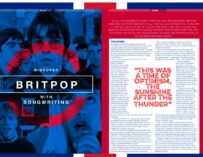
Guy Chambers: “The middle eight for me should take you on a journey away from the chorus and the verse, take you far enough away that when you come back to the final chorus it sounds different.”
Drawing from the acclaimed songwriter’s first-ever online course, we share some of the secrets behind his success with Robbie Williams
Throughout September, we’re teaming up with the online learning platform MusicGurus and Guy Chambers, one of the UK’s most successful songwriters who, along with his writing partner Robbie Williams, helped shape the sound of pop music for much of the 90s and 00s. As part of this partnership, Guy will be providing the lucky winner of this competition bespoke feedback on their original music submission – a genuine once-in-a-lifetime opportunity that we couldn’t be any more excited about. Head over to the competition page for details on how to enter.
Not only that, but we are also offering our readers an exclusive 15% discount code (SWSEPT15) for Guy’s online course with MusicGurus, Song Studies: The Songwriting Secrets of Guy Chambers. Taking a step-by-step look at three of his biggest hits – Angels, Feel and No Regrets – you’ll not only learn the secrets behind these smash songs but be given plenty of tips and tricks which can be applied to your own songwriting.
Always keen to learn, we took the course for ourselves and it really did feel like we were receiving a masterclass from a genuine giant of their field. Watching Guy sat at his piano, explaining his creative process, was a bit like being welcomed into the songwriting equivalent of The Magic Circle.
Here are just five of the many songwriting secrets Guy shares over the course of the 18 in-depth lessons…
1. Getting To The Chorus
“The thing about the second verse in Angels is it’s shorter than the first and the melody is slightly different to the first verse as well. I don’t know if Rob and I spoke about it, but we decided that the second verse should be shorter than the first because we wanted to get to the chorus quickly. We knew that the chorus was important and we didn’t want a verse that would stop that flow. So we went straight to the last part of the first verse, which you might call the pre-chorus.”

Guy Chambers (left) on writing Angels with Robbie Williams: “I think it has a message that’s very universal. It’s one of the few lyrics that Rob has written that isn’t just about him.”
2. Creating A Universal Message
“Angels was our first really big hit record. Why was it such a really big hit record? I think it has a message that’s very universal. It’s one of the few lyrics that Rob has written that isn’t just about him. Yes, there are lots of ‘I’s’ in it, but it’s describing a situation that I think people of any age and any nationality can relate to… I think that’s one of the reasons that it was such a big hit. I think the other reason is that it was a real comforting song. It’s sort of comfort food, that’s how I’d describe the music. It takes you on a journey but it’s not a jarring journey, it guides you on a journey.”
3. Writing A Memorable Riff
“I’m always obsessed with riffs; I think riffs are really important in songs. To give a good example of a riff, Let Me Entertain You is a good riff. You might ask: how did I come up with the riff for Feel? I was probably doing a lot of messing around with different chord sequences, that sort of thing, thinking, ‘That’s a bit boring,’ criticizing myself… the thing about that riff is that it’s all white notes for a kick-off and it’s the same triad, just moving around the keyboard, then back down and so it’s D-minor, A-minor, F, G. But instead of sounding quite clunky it sounds completely different if the bass is just on the D and the chords move around.”

Guy Chambers: “Harmonies open the door to different types of melodies that you might not think of.”
4. The Power Of Middle Eights
“The middle eight for me should take you on a journey away from the chorus and the verse, take you far enough away that when you come back to the final chorus it sounds different. You’ve already heard the chorus twice by this point. You want the final chorus to feel different and the only way to do that is to take the listener on a journey, that’s my feeling about it.
This particular middle eight on Feel, it’s the guitar solo which does that with a different melody that you haven’t heard anywhere in the song. It’s a new melody. It’s the same music but it feels different because it’s a solo, there are no words. Then, when you get the chorus again, there’s that relief of, ‘I know this bit but it feels different because I’ve been taken away from it.’ That’s the function of a middle eight for me.”
5. The Importance Of Knowing Your Chords
“If you’re a budding guitarist it’s great to learn all the standard chords like C and G and A-minor and F, but there’s a lot of other stuff on the guitar that I think is worth learning, like diminisheds and augmenteds and major 7ths. It’s worth studying jazz chords, it opens your mind to a whole other set of harmonies and different melodies as well. Harmonies open the door to different types of melodies that you might not think of.”


































Related Articles